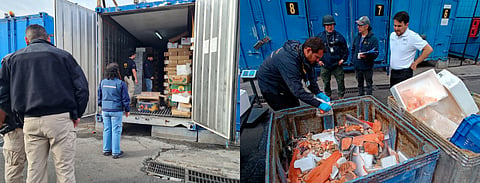

The operation was supported by the National Fisheries and Aquaculture Service (Sernapesca).
Sernapesca
Chilean authorities have arrested 22 people and seized more than 18 tons of export-grade salmon, after carrying out an investigation that began more than a year ago.
Those responsible have been identified as two criminal organizations that were stealing trucks transporting this product from Calbuco, in the Los Lagos region.
The operations were led by the Metropolitan South Prosecutor’s Office together with the Investigative Police (PDI), and were supported by the National Fisheries and Aquaculture Service (Sernapesca) and the Internal Revenue Service (SII).
"These two organizations, through violent operational crews, were stealing these shipments. Within the structure they used other companies that owned transport trucks to transfer the cargo and move it to different parts of Chile—specifically the Metropolitan Fish Terminal, as well as the Fifth Region—where it was distributed on the secondary market at much lower prices than usual," explained Inspector Prefect Marco Ramirez, National Chief of Robbery and Criminal Focus of the PDI.
Likewise, the Metropolitan South Regional Prosecutor, Héctor Barros, emphasized: "What we are talking about here is not isolated crimes. We are dealing with organized criminal activity in various stages and involving different types of offenses, such as in this case, the theft of marine products."
At the Metropolitan Fish Terminal (TPM) alone, nearly 18 tons of various resources were confiscated, including salmon, Patagonian grenadier, common hake, conger eel, and Chilean abalone, among others. In addition, 560 kilos of marine products stored and sold without documentation proving their legal origin were seized from a commercial premises in Papudo.
"This has been an operation involving several regions, and we are very satisfied because, in addition to the salmon theft, we were also able to detect illegal fishing, which harms the conservation of our biological resources, distorts market prices, and often poses a serious problem for artisanal fishers," stressed Soledad Tapia Almonacid, National Director of Sernapesca.
Following the corresponding sanitary analysis, authorities determined that nearly 6 tons of the seized products must be destroyed because they were not fit for human consumption, while approximately 12 tons will be donated to charitable organizations in various municipalities of the Metropolitan Region.
